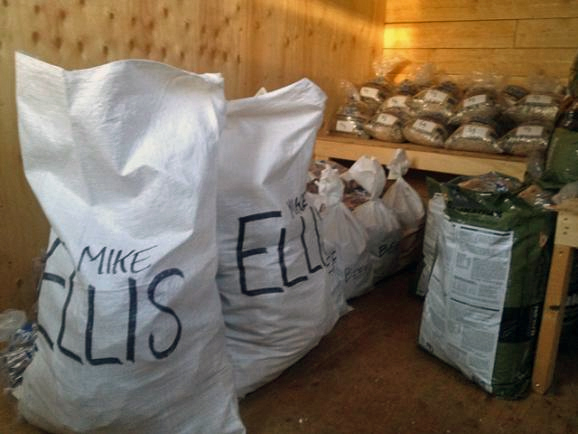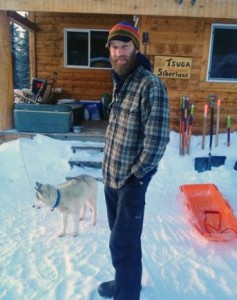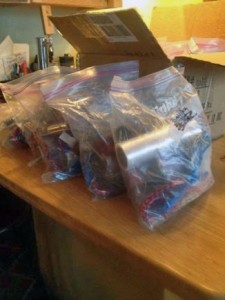
On Saturday, volunteers with the Yukon Quest International Sled Dog Race gathered drop bags from mushers in both Whitehorse and Fairbanks.
Over the next two weeks, race personnel will deliver the bags to nine checkpoints along the 1,000 mile trail. Packing more than 1,500 pounds of food and gear for a remote sled dog race is a long, logistically-challenging process.

“So you get your beef and your kibble and your snacks and there all the heavy stuff down there on the bottom,” Fairbanks Musher Mike Ellis said.
Ellis spent more than a week filling large white bags with all the things he needs along the Yukon Quest trail.
“And then a glove bag so I’ve got nice dry warm gloves,” he said. “I always throw some hand warmers in because it’s bound to be 50 below somewhere on the Quest.”
We’re standing inside his guest cabin. Various piles of food and gear cover the floor and fill the corners. Across the yard, boxes filled with all different kinds of things sit on the front porch of his house.
“That looks like the burrito box – about 10 different kinds of burritos made up – breakfast burritos,” Ellis said.
There’s been gear spread all over the place for a week or two. Behind us, white ice cube trays were also stacked high along the outside wall of his house.
“Those are electrolyte cubes that get sent out for the dogs if it gets really warm,” Ellis said.
If it gets really warm. Ellis and a team of charismatic Siberian huskies will start the race for the sixth time this year. He’s run the Quest enough to know he should be prepared for anything. It’s kind of a logistical nightmare. When the weather is warm, dogs need more water. If it’s super cold, they’ll want more fat. So, Ellis has to pack two different kinds of food.
“Fish and chicken skins,” Ellis said. “If it’s warm, I’m feeding the fish and if it’s cold I’m feeding the chicken skins and one or the other of them is just going to get set aside and you know that right off the bat.”
Sled dogs also go through some big changes as they travel farther down the trail.
“In the beginning of the race, you’re feeding a lot more protein and then at the end of the race, or middle to end of the race you’re feeding lot more fat because the dog’s metabolism changes and shifts to burning fat,” Ellis said.
So, drop bags Mike Ellis packs for the beginning of the race are different from those waiting for him at checkpoints near the end. There’s also human food in those bags. Ellis says he’s learned over the years that there are some things he just can’t leave home without.

“I used to go off coffee for the race and I find that messes me up way more than staying on it for the race,” Ellis said. “I eat a lot more bread and carbs on the race. I used to think I was a little more doggy, and able to just eat fat the whole way and that wasn’t very kind to my body.”
There’s also one food in particular that’s become wildly popular among mushers in recent years.
“Candied bacon. Yeah I don’t even think it’s possible to go down the Quest trail without that stuff,” Fairbanks musher Cody Strathe said. “It’s so true. Sometimes at the beginning of the race you don’t really want it, but by the end of the race you just crave it ,that’s all you want.”
He also spent the last week frantically piecing together his drop bags for a second run down the Quest trail. He’s standing in front of a freezer in his arctic entryway. It’s stuffed full of food prepared by friends.
“We’ve got peanut butter bars, and peanut butter cookies and smoothies!” Strathe said.
Outside the house, a giant meat saw ran all week. Strathe and his handlers cut countless, 50-pound frozen blocks of beef, lamb and other meat into chunks for his dog team. They also sliced up chunks of fish.
Aside from all the food, mushers also stuff drop bags with extra runner plastic and other parts for their sleds. They also have to pack required gear like dog booties. According to the race rules, mushers must have eight booties for every dog on the trail. Back inside, there are rows of bags stuffed with booties sitting on Strathe’s couch. He’ll also bring along extra boots, boot liners and socks for his own feet.
“I’ve got enough socks to have a fresh pair of socks at every check point,” Strathe said.
Ziploc bags filled with first aid items cover Strathe’s kitchen countertop.
“I’ve got stuff for vet care in here,” Strathe said. “I carry homemade fire starters with wax and sawdust so in case I get in trouble, I can start a fire real quick; matches, lighter, lithium batteries for my headlamps.”
In the end, he packed roughly 40 drop bags for the Yukon Quest. Mike Ellis says he usually sends out 35. But neither musher wants to consider the cost of all this food and gear.
“This time of year, we try not to look at it because it’s too depressing,” Ellis said. “It’s a lot, I don’t even want to think about it really!”
Yukon Quest staff and volunteers will deliver drop bags from the 19 mushers signed up for the race to various checkpoints along the route. The 31st Yukon Quest starts in Fairbanks on Feb. 1.




